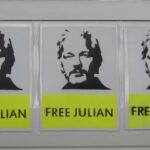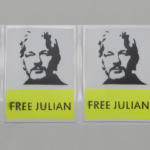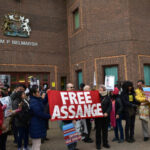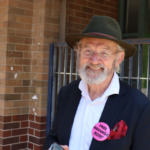Assange Appeals for His Life, Global Press Freedoms and International Justice
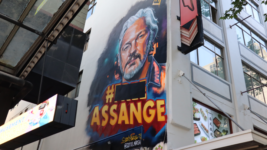
Award-winning Australian Journalist Julian Assange was too sick to attend the most vital appeal of the US request to extradite him, which the UK has already greenlighted, and this was because the White House and 10 Downing Street have been mentally and physically crippling him via detention for the last 12 years.
The appeal of the WikiLeaks founder took place this week before two justices of the UK High Court in London. And they’re now considering whether the evidence before them warrants the traumatised Australian journalist being able to appeal the June 2022 UK decision to allow extradition to the US.
If Assange is extradited to the US, it’s expected it will mean his death. The initial UK ruling of January 2021 denied extradition based on mental health, as he posed a suicide risk. And his state of mind has only diminished further since then, and the revelations out of the States have gotten more extreme.
Indeed, Assange’s acts of journalism comprise the largest exposure of classified information in history, and as this revealed US crimes and corruption, the White House, and increasingly the CIA, have been slowly destroying him via the use of detention for over a decade now, with UK assistance.
And this week’s UK hearings regarding the Townsville-born son hold wider significance than the toll the outcome could have for him, as US extradition and conviction sets a damning precedent for press freedoms and the extralegal nature of the show trial is undermining international justice.
Lethal extradition
Long-time federal parliament supporter of Assange, Independent for Clark MP Andrew Wilkie was present at the hearings in court number 5 of the Royal Courts of Justice this week, as he thought it was important that an Australian parliamentarian was there to represent Canberra.
Wilkie and US journalist Chris Hedges both remarked that justices, Dame Victoria Sharp and assisting her Jeremy Johnson, seemed interested in the case in a manner that reflected they were unfamiliar with the finer details, which does hold hope that they might see reason to allow another appeal.
After the defence made its case on 20 February, Stella Assange, Julian’s wife, debriefed crowds of supporters outside the court, outlining that the UK courts had finally heard evidence of the US plots to murder her husband and former CIA director Mike Pompeo’s obsession with killing him.
“Our rights are at stake, but Julian’s life is at stake,” Stella was heard to remark on Wednesday, the second day of hearings. “If he is extradited, he will lose his life. He will be killed. He will be killed by the country that has been plotting his assassination.”
Such evidence was not before the UK High Court, when it overturned the initial decision not to extradite the Australian journalist to the jurisdiction of one of our nation’s closest allies, as the US had provided four assurances to the UK in relation to how it would deal with Assange in its custody.
These comprised of not placing Assange in special administrative measures (SAMS) detention or the notorious ADX Florence supermax prison, that he would receive mental health care whilst in custody, and he would be allowed to serve any prison time in Australia following sentencing.
However, the US also reserved the right to reverse these determinations if Assange does commit an act in the future that warrants a stint in Colorado’s ADX Florence facility.
Defending the Australian journalist
The June 2020 US second superseding indictment contains eighteen charges regarding Assange’s actions in publishing redacted leaks of US cables over 2010-11 that served to expose US war crimes in Iraq and Afghanistan, which were basic journalistic acts and in that sense, nothing special.
Australian barrister Jennifer Robinson told WikiLeaks after Tuesday’s hearing that the Assange team presented the long-raised point that the US is seeking to extradite under the US-UK Extradition Treaty on espionage charges, but the agreement specifically denies this over political offences.
“We say that’s unlawful under international law and that it constitutes an abuse of process of this court, for the US to knowingly make a request, which is prohibited by the terms of the treaty” explained Robinson.
The barrister further outlined that the leaking of the US documents by then US army officer Chelsea Manning would be protected by free speech and whistleblower protections under European law, which also then considers the journalistic acts performed by Assange as “protected acts”.
Robinson further made clear that the legal team had raised concerns about the death penalty being an available sentencing option in the US, which could lead to extra charges triggering this and that the conduct in the indictment could be used to attract new charges that warrant execution.
Killing the messenger
The murder plots Stella raised and the possible further charging that might occur over other acts relate to Assange having leaked Vault 7 in 2017. This was the CIA’s secret manual containing hacking tools, and the leak didn’t explain how to use them, but set out what they could do.
The content of the Vault 7 leak included that the CIA has the ability to turn iPhones, Android smartphones, Microsoft’s Windows and even Samsung TVs into covert recording devices.
One of the Yahoo News journalists that broke the story regarding the CIA plot to kidnap Assange and the contemplation of assassinating him in 2021 was Michael Isikoff. And he told Democracy Now that same year that “what really set Mike Pompeo, the new CIA director, off was that Vault 7 leak”.
Prior to this, the Obama administration had determined not to go after Assange, and it was Pompeo who then commenced the pursuit of the Australian journalist in 2017, announcing publicly that WikiLeaks was a “nonstate hostile intelligence service”, which Isikoff underscores wasn’t simply talk.
“In fact, that designation, internally, opened the door for the CIA to launch and plan all sorts of operations that didn’t require a presidential finding… and wasn’t going to be briefed to Capitol Hill,” the journalist said, adding that deliberations included potentially kidnapping Julian.
The Trump administration then initiated extradition proceedings in May 2019. And Hedges outlined in an article this week that the UK court heard that then US president Donald Trump had sought “detailed options” on how his administration might murder Assange in the Ecuadorian Embassy.
A planetary chilling effect
As to the determination of the UK High Court in relation to this week’s appeal, there had been talk of an outcome being delivered as early as next week, however after the second day of hearings on the 21 February, the two judges announced there would not be a decision until at least March.
And it has been raised that one of the judicial officers, Justice Johnson, has previously represented M16, the UK’s secret service, and the UK Ministry of Defence, as a specially vetted lawyer, with the ability to access top secret information.
International Federation of Journalists deputy general secretary Tim Dawson said on Tuesday that any trial would take place in East Virginia, which is the location of the CIA, the Pentagon and other key defence organisations, meaning any jury would comprise of former staff and family members.
The journalist told France 24 on Tuesday that there is extensive evidence that the CIA went on to bug Assange’s meetings with his lawyers, whilst he was holed up in London’s Ecuadorian Embassy for seven years, prior to being taken into British custody and held on behalf of the US in April 2019.
“The actions for which they are seeking to prosecute Julian Assange are seeking out a source for wrongdoing and discreetly helping that source to pass information to somebody who intends to publish it and then publishing it for general consumption,” Dawson further set out.
“Those, it seems to me, seem to be the actions that journalists undertake every day,” he said in conclusion.
“If Assange is convicted, then journalists all over the world, if they are offered security classified information, whatever it reveals, will find themselves thinking do I want to risk 175 years in prison? Is this story worth it?”


